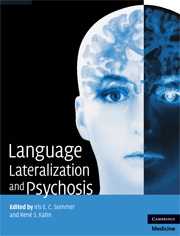Book contents
- Language Lateralization and Psychosis
- Language Lateralization and Psychosis
- Copyright page
- Contents
- Contributors
- Preface
- Section 1 Asymmetry, handedness and language lateralization
- Section 2 Language lateralization and psychosis
- 8 Hand-preference and population schizotypy:
- 9 Functional imaging studies on language lateralization in schizophrenia patients
- 10 The role of the right hemisphere for language in schizophrenia
- 11 Auditory verbal hallucinations and language lateralization
- 12 Language lateralization in patients with formal thought disorder
- 13 LRRTM1:
- Index
13 - LRRTM1:
a maternally suppressed genetic effect on handedness and schizophrenia
from Section 2 - Language lateralization and psychosis
Published online by Cambridge University Press: 10 December 2009
- Language Lateralization and Psychosis
- Language Lateralization and Psychosis
- Copyright page
- Contents
- Contributors
- Preface
- Section 1 Asymmetry, handedness and language lateralization
- Section 2 Language lateralization and psychosis
- 8 Hand-preference and population schizotypy:
- 9 Functional imaging studies on language lateralization in schizophrenia patients
- 10 The role of the right hemisphere for language in schizophrenia
- 11 Auditory verbal hallucinations and language lateralization
- 12 Language lateralization in patients with formal thought disorder
- 13 LRRTM1:
- Index
Summary
Keywords
- Type
- Chapter
- Information
- Language Lateralization and Psychosis , pp. 181 - 196Publisher: Cambridge University PressPrint publication year: 2009
- 1
- Cited by

